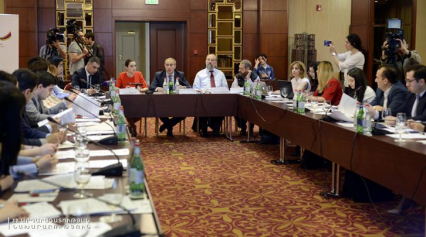Draft Law of the Republic of Armenia "On freedom of information" discussed
25/05/2017

The discussion of the draft Law of the Republic of Armenia "On freedom of information" was held today with the participation of Deputy Minister of Justice of the Republic of Armenia Suren Krmoyan and with the support of the German Agency for International Cooperation (GIZ).
Around three dozens of representatives of the state and private organisations concerned attended the meeting held within the framework of the GIZ Project "Legal Approximation towards European Standards in the South Caucasus."
Suren Krmoyan stressed that the new draft Law was developed on the basis of the request of the civil society, as well as the issues emerged during implementation of the acting Law adopted in 2003, which are the subject matter of this Law. According to him, the new draft Law is targeted at the exercise of human rights, the fight against corruption and participatory governance. The Deputy Minister stressed the importance of and highlighted the regulations concerning the introduction of an electronic inquiry system, the proactive policy of bodies possessing information, as well as the maintenance and publication of information registers.
The Deputy Minister also touched upon the most discussed issue of creating an authorised body for freedom of information and noted that the aim of that idea was to create additional mechanisms in the sphere of freedom of information.
In closing, Suren Krmoyan noted that the main principle of the draft Law of the Republic of Armenia "On freedom of information" is that it will be considered and adopted on the basis of broad consensus with all the parties concerned.
Afterwards, GIZ expert Nora Sargsyan briefed the participants on the joint efforts of the Ministry of Justice of the Republic of Armenia and the German Agency for International Cooperation on the draft Law, as well as the entire period for preparation of the draft Law.
Expert of the German Agency for International Cooperation Otto Luchterhandt delivered to the participants of the discussion his remarks on the draft Law and noted that it is more up-to-date than the acting Law, especially in terms of digitalisation, but there are grounds for its further improvement. From among the positive features, he marked out the procedure for provision of information by the state authorities and the provision on applying electronic means for the receipt of information.
The expert's remarks were also followed by a professional discussion aimed at improving the draft Law.











